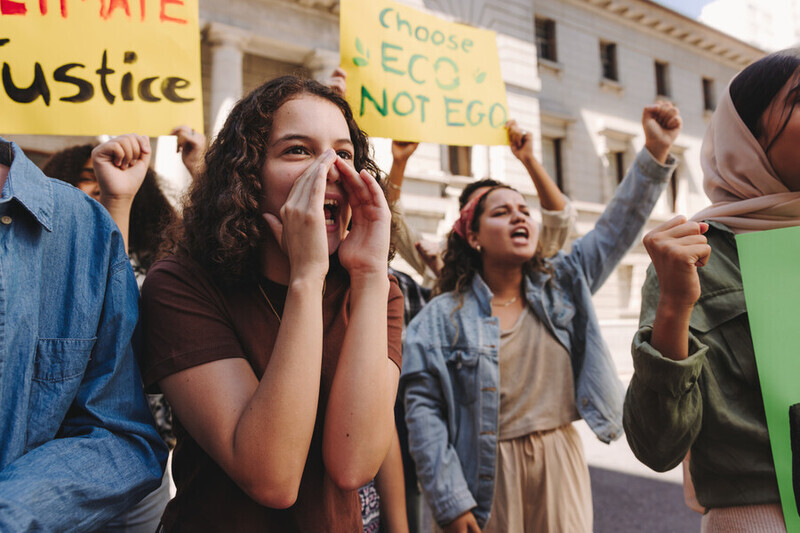hankyoreh
Links to other country sites 다른 나라 사이트 링크
[Guest essay] Gender equality: The missing link in climate action


By Colin Crooks, British ambassador to South Korea
2023 was Korea’s hottest year on record and deadly floods triggered by extreme rainfall have killed dozens of Koreans two summers in a row. Here in Korea and around the world, the urgency of tackling the climate crisis could not be more apparent. We must urgently work together to tackle this problem. This is why the British Embassy is hosting its inaugural Green Week, bringing together Korean and British policymakers and businesses across 20+ events to accelerate UK-Korean collaboration on climate action.
We have timed Green Week deliberately to coincide with International Women’s Day to emphasize that women must be at the heart of climate action. Gender equality is relevant to both how we understand and address the impacts of climate change, and to how we guarantee our society’s best chance of success in solving the problem.
Developing nations bear the brunt of climate change’s worst impacts, but it is women in these countries who are disproportionately affected. The power of the climate crisis to exacerbate existing inequalities is well documented. As developed countries like Korea and the UK help these countries to adapt to climate change, we must prioritize gender-based solutions that address women in developing countries’ needs and empower them to contribute their experiences and perspectives to the development of these solutions.
The UK has already pledged to increase its gender-focused climate finance, including the US$2 billion of funding recently committed to the Green Climate Fund. I would like to see Korea do the same. Together, through our strategic development partnership, the UK and Korea have a unique opportunity to champion gender equality in climate-focused development work. We must continue to hold ourselves, and the wider international community, accountable for translating this into tangible action.
It’s not enough to just tackle the impacts of climate change. We must also develop long-term innovative solutions. The climate threat is existential, and yet we are squandering our most valuable resource: our people. According to the Korea Foundation for Women in Science, Engineering and Technology, only 21% of students majoring in STEM subjects in Korea are women. Only 60% of these women eventually find jobs in STEM fields. And yet these are the very same sectors that are essential to society’s transition to a greener future.
Although the problem is particularly acute in Korea, it’s a global problem — women hold only around 30% of renewable energy and scientific research jobs worldwide. Why are we underutilizing the skills and potential of 50% of our population whilst trying to address the most important challenge of our time? If it was any other resource, the wastefulness would be considered shameful.
Tackling the climate crisis is only possible if we fully harness the human ingenuity, scientific innovation and technological progress of which our society, including women, is capable. Luckily, British and Korean women have talent, expertise and potential in abundance, as I have seen first-hand throughout Green Week. The embassy hosted an event highlighting the work of four Korean and British female scientists. Their research has demonstrated the threat of rising sea levels to cities like Incheon and the relationship between climate change and the spread of bacterial diseases, and they are developing ways to make renewable energy generation more efficient and less costly.
We also challenged middle and high school girls to imagine themselves as an ambassador for a day calling for climate action at an international summit. The speeches I watched were delivered with passion and clarity of thought that would give many real-life diplomats a run for their money!
It is our duty to take seriously the lack of female representation in STEM and remove the barriers women face in pursuing successful careers in these sectors. We also need to prove to girls that this is a viable career path for them and that their passion will not be squandered. Korea is already at the forefront of so much scientific and technological innovation. Just imagine if every female aspiring scientist, budding engineer or technology whizz in Korea was empowered, like their male counterparts, to unleash their full potential for the good of our planet.
Quite simply, a sustainable future is impossible without a gender-inclusive climate movement. On International Women’s Day, I want to call on Korean policymakers, businesses, educational institutes, and the general public to work with the UK to make Korea’s climate movement more inclusive of women. If we can unleash the potential of Korea’s women and properly address the needs of women most severely affected by climate change, our work to create a greener future will be more effective and equitable as a result.
Please direct questions or comments to [english@hani.co.kr]

Editorial・opinion
![[Column] Season 2 of special prosecutor probe may be coming to Korea soon [Column] Season 2 of special prosecutor probe may be coming to Korea soon](https://flexible.img.hani.co.kr/flexible/normal/500/300/imgdb/original/2024/0426/3317141030699447.jpg) [Column] Season 2 of special prosecutor probe may be coming to Korea soon
[Column] Season 2 of special prosecutor probe may be coming to Korea soon![[Column] Park Geun-hye déjà vu in Yoon Suk-yeol [Column] Park Geun-hye déjà vu in Yoon Suk-yeol](https://flexible.img.hani.co.kr/flexible/normal/500/300/imgdb/original/2024/0424/651713945113788.jpg) [Column] Park Geun-hye déjà vu in Yoon Suk-yeol
[Column] Park Geun-hye déjà vu in Yoon Suk-yeol- [Editorial] New weight of N. Korea’s nuclear threats makes dialogue all the more urgent
- [Guest essay] The real reason Korea’s new right wants to dub Rhee a founding father
- [Column] ‘Choson’: Is it time we start referring to N. Korea in its own terms?
- [Editorial] Japan’s rewriting of history with Korea has gone too far
- [Column] The president’s questionable capacity for dialogue
- [Column] Are chaebol firms just pizza pies for families to divvy up as they please?
- [Column] Has Korea, too, crossed the Rubicon on China?
- [Correspondent’s column] In Japan’s alliance with US, echoes of its past alliances with UK
Most viewed articles
- 1After election rout, Yoon’s left with 3 choices for dealing with the opposition
- 2Why Kim Jong-un is scrapping the term ‘Day of the Sun’ and toning down fanfare for predecessors
- 3Two factors that’ll decide if Korea’s economy keeps on its upward trend
- 4Noting shared ‘values,’ Korea hints at passport-free travel with Japan
- 5AI is catching up with humans at a ‘shocking’ rate
- 6Why Korea shouldn’t welcome Japan’s newly beefed up defense cooperation with US
- 7‘We must say no’: Seoul defense chief on Korean, USFK involvement in hypothetical Taiwan crisis
- 8[Column] Season 2 of special prosecutor probe may be coming to Korea soon
- 9Korea’s 1.3% growth in Q1 signals ‘textbook’ return to growth, says government
- 10Exchange rate, oil prices, inflation: Can Korea overcome an economic triple whammy?